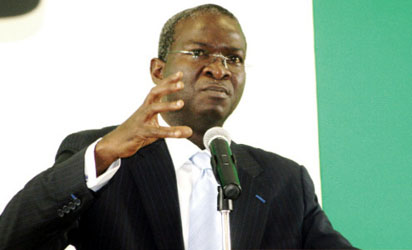
Minister for works,power and housing
Distinguished Ladies and Gentlemen,
As you converge at this year’s National Conference, whose theme is “Expanding National Resources and Infrastructure in Challenging Times,” I welcome your invitation to participate as Guest Speaker on the Topic: “Expected role of insurance in Infrastructural Development.”
You have identified these times as challenging times. Perhaps so. But I have always taken the view that there will always be challenging times.
The paradox may well be that it is challenges that give spice to life.
There were challenges in Nigeria in 1950s; when we were under a colonial Government, and there were places we could not go as black people in our land.
Today as we take for granted the liberty to move freely without restraint as a consequence of the colour of our skin, let us continue to honour the memory of those nationalists who agitated and secured our independence.
They responded to the challenges of their time.
Since independence, there have been challenges; from political instability, agitation for democratic rule, military dictatorships, a bloody Civil War, how to optimize on our diversity, Ebola in two urban centers in Africa’s most populous nation, a divisive election that was first heralded by gloom and doom forecasts.
But every time we have faced these challenges, every time we have come close to the brink, I urge you never to forget that some men and women of character had stood up to pull us back from the brink, and worked tirelessly to pull us back to ourselves.
Let us never forget that, no matter the challenges that we deal with today.
This nation has shown the character that it is made of; a land of men and women of resilience.
Some countries have been built on bravery, some on industry, some on faith, some on the coalition of their diversity and some on their resourcefulness.
In all those nations where the people have pooled together, the result has been a better life.
We can and we must rebuild our nation around our resilience. If you permit me, I will say that this is the land of the resilient.
Therefore, we must not be defined by the existence of challenges or even their magnitude. Rather it is the quality of our resilience in the face of adversity that must become our global brand.
We must rebuild our nation on foundations of our unflagging resilience; and this is the spirit with which I address the work that needs to be done, not only with the insurance business but with infrastructure renewal and development
It is true that our infrastructure is old and aging; and our population has outgrown it. But it is also true that this is the consequence of our choices, bad budgeting, underfunding of infrastructure and poor utilization of resources.
But all that is yesterday.
Today that is changing. From an average 15% annual capital expenditure out of an average budget of N 4 Trillion over the last five years, this country, under President Buhari now budgets, in 2016, a 30% annual capital expenditure of a N 6 Trillion budget to start to address the deficit in capex spending.
For contractors and workers who have not been paid for 2 to 3 years, something is changing.
They are re-mobilizing back to their work sites on major highways like Sokoto-Kotangora-Makera, Kano-Maiduguri, Ilorin-Jebba, Lagos-Ibadan, Loko-Oweto, Ihiala to mention a few.
What has all this got to do with insurance? A lot.
First, let us remember that insurance is a component and important part of our finance subsector; but it has probably played a second role to banking; and without intending to be judgmental, has not optimized the opportunities for growth, expansion and inclusion.
Let me illustrate the point with a few examples.
How many markets have burned down in Nigeria in the last 10 years? Infrastructure has been destroyed as a consequence.
But how many of them were insured? How many were rebuilt from the proceeds of insurance claims payments ?
How many small business owners in those markets who depended on small shops and stalls were left without redress after losing their wares to market fires?
Do they not have an insurable interest? Did our insurance sector not have policies for these kind of people?
How many homes have been ravaged by flood or fire leaving citizens without recourse except for Governmental intervention, because the houses were not insured, or belongings such as jewelry, furniture, electronics and so on were not insured.
Why is our insurance sector not impacting in quantity (not at all) on the majority of our vulnerable people?
Is it because we are not designing policies to fit the need of the market, or the cost of policies are out of reach, or there is a cultural resistance to insurance or a combination of these and more, including issues of prompt payment (or lack of it), of claims?
Is the lack of insurance penetration due to some of the hurdles in the way of settlement of claims, such as the need for police reports and its related bureaucracy?
Can we not make these processes simpler and more attractive?
Can our resilience be oblivious to these challenges and the enormous opportunities that they provide to grow this economy, create jobs for young people to market and sell policies?
Ladies and gentlemen, I must not be misunderstood to see the insurance sub-sector from a prism of gloom.
On the contrary, I acknowledge the reforms that have taken place by way of legislation and policies to strengthen capital base and improve corporate governance.
Instead, I seek to use this opportunity to inspire practitioners to be more innovative, entrepreneurial and embracing of the diverse needs of our big and promising economy.
I have heard people from other countries tell me that they cannot travel to certain countries or certain regions because of the risk in these countries or regions which are restricted by their personal insurance.
On the converse, how many of us go from here to higher risk countries and regions without any thought of insurance?
I have seen young people in other countries, buy insurance and special warranties (against theft) for their laptops, their phones, their cameras and other personal effects, which helps to drive the insurance business in those countries, in a way that is yet to happen here.
The truth is that those policies do not drop from the sky. Those policies did not exist when insurance business started many centuries ago.
They evolved from the responsiveness of insurance practitioners in those economies to the emerging needs of their young population in a way that spoke of their entrepreneurial spirit.
Let me ask them how many individual personal telephone, laptops (except perhaps corporate policy) in Nigeria have any insurance policy here in a country that is reported to have over a 100 million telephone subscribers and is perhaps the leading Internet penetrator on the continent by size.
Is this not a missed opportunity?
Let me ask again how many of the schools, bridges and other public infrastructure damaged by terrorists were insured and can be rebuilt by payment of insurance claims rather than direct government funding.
In terms of untaken opportunities, how many practitioners here have issued policies to state governments to insure public assets (other than official vehicles) such as state houses, public schools, public hospitals, roads and bridges?
Can we truly speak of insurance and infrastructural development, without taking up these glaring economic opportunities for growth and jobs?
It seems to me that when we speak of the lack of a maintenance culture (as we publicly choose to speak of our neglect of infrastructure), we fail to see the role that insurance can play in galvanizing maintenance into a way of life.
This is because, once you insure a property, you also assume an obligation as the insured, to look after that property.
Ladies and gentlemen I will now seek to provide some answers by sharing some examples that we can develop and improve upon; based on my own experience as Governor in Lagos.
When we launched the Security Trust Fund to support the police in Lagos, one of its components was a group insurance policy for officers of the Rapid Response Squad (RRS) who had to put their life in harm’s way in order to make us safer.
The policy provided for payment of compensation for death or disability to members of the squad.
Painfully and sadly, from time to time we had to make such claims and pay victims or their families when they got injured or killed by criminals.
But I know and recall first-hand the testimonies of inspiration it provided for those officers, to go out and do their duties without fear.
It was a benefit to the insurance business and to society’s safety.
I can recall and share with you the difficulty we initially encountered in getting health workers to the frontline when Ebola broke.
An idea to provide immediate life insurance for everybody who signed up to combat Ebola made the difference, immediately the Commissioner for Health announced the decision of Government.
I can also recall and share with you the risk associated with pulling down the partially collapsed Multi-storey NIDB building under a controlled explosion program.
There was an old and historic church next to the building, about 3 metres or thereabouts, and there was the equally close newly built multi-storey Afribank headquarters.
It was possible that a force of the over 5000 explosives necessary to bring down the partially collapsed building would damage the historic church or the Afribank building or even bring them down completely.
Everybody, including me, was afraid of the risk, but the risk of a partially collapsed building suddenly collapsing without warning and its consequences meant that we had to proceed in spite of our fear.
Insurance provided the answer.
On advice by Nigerian and foreign engineers, we took out a block insurance policy with AIG for every building within a one kilometer radius of the demolition site.
In the event, no building was damaged, no claim was made and no compensation was payable.
In the area of construction of buildings, the Lagos State Government, through an Executive Bill, championed the passage of Lagos State Urban Planning and Development Law of 2010.
The relevant provisions separated issuance of planning permit (for the construction of buildings) from building supervision by creating a building control agency.
The law then required any person engaged in building construction to submit a general contractor’s All risk insurance policy certificate.
The intent was to ensure that by taking out building insurance, insurance companies who issued policies will seek to avoid claims by creating conditions in policy, to ensure that professional conduct increased in the building process, by ensuring use of quality material and compliance with approved plans, and ultimately result in buildings that did not collapse; whenever a building of more than 2 (TWO) floors was involved.
There was also provision for compulsory Insurance of existing buildings and I believe that this helped to curtail the incidence of building collapse if they did not totally eliminate them.
There is of course the 2010 Federal Workmens Compensation Act which repealed and replaced the 2004 legislation.
They provided for insurance cover for workmen in respect of occupational disease (arising out of exposure to risk factors ), and also for injuries from accidents at the workplace or in the course of employment.
How many of the various contractors of government or private companies have such policies in place?
In my current role as minister, I can only offer now that I will be using this platform to insist that all our state Controllers should take steps today to demand and ensure that all our contractors provide proof of compliance with this Law, by taking out policy for their workers.
I will do my best to ensure compliance and protection for Nigerian workers.
It seems to me that insurance practitioners have a role to play here, by designing policies that are appropriately priced and by promptly responding to claims in order to boost confidence in the business of insurance.
It remains for me to also point out that during the period of my tenure, major public assets like the state secretariat, hospitals, schools, strategic bridges in Lagos were covered by insurance policies for their reinstatement values up to the year 2015.
In this age of climate change, disasters by flooding, terror and bombings, it seems to me that this is one way by which a new economy can be created from adversity.
Some jurisdictions have started creating what is called Terrorism Insurance in the aftermath of increasing acts of terror in order to provide a recourse when these acts sadly occur.
Some of such policies cover personal injuries and deaths from acts of terror to infrastructure such as buildings and others have been described as residual value insurance.
The point to make is that the categories of policy that can be created in relation to infrastructure are limited only by the enterprise and imagination of the practitioners.
How far are the Nigerian market is willing to pitch depends on the appetite of the practitioners, and of course the collaboration that Government can provide by further legislation if needed, or new policy or reforms that enable new ground to be broken.
We will therefore all do well to remember that insurance and infrastructure mean nothing if they do not impact and benefit people.
So beyond the hardware of insurance of brick and mortar, there is the continuing soft side of human lifestyle, and humans frailties that insurance can help to cushion.
Ladies and gentlemen, let me conclude, firstly, by saying that insurance has an important role to play in helping to develop and maintain our infrastructure.
Secondly by contending that we can create prosperity from the challenges of austerity in the public and private sector infrastructure if we look beyond performance bonds that are usually given to ensure that contractors discharge their responsibility;
Thirdly, by inviting the insurance practitioners to lead the change they wish to see in the industry; because places like healthcare infrastructure such as hospitals are only the beginning, there is health insurance that guarantees access to the healthcare facility that is built;
Fourthly by saying that our housing programs will provide a potential market of opportunities by way of performance bonds, workmen compensation insurance and mortgage insurance policies as a start;
Fifthly, to urge us to see the possibilities in insuring schools, government buildings, roads and bridges as frontiers for deepening insurance practice into such areas as insurance for children’s education; and
Finally, to thank you for your attention.





